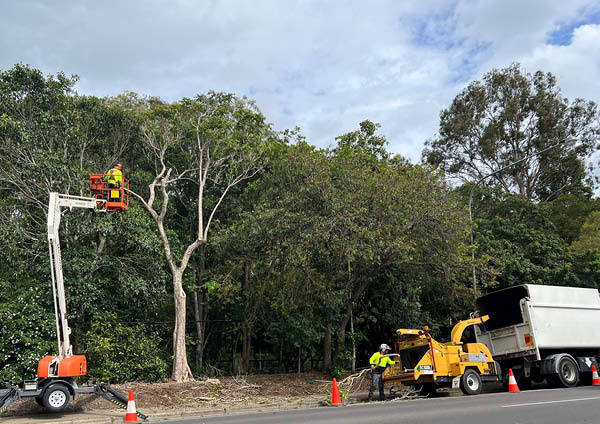All African Tulip Trees in Council parks being removed

All African Tulip Trees in Fraser Coast Regional Council owned parks and gardens will have been removed by the end of March 2023.
Fraser Coast Mayor George Seymour today inspected the work being done to remove the trees on Elizabeth Street near the Hervey Bay Botanic Gardens in Urangan.
The Mayor said Council introduced an African Tulip Trees eradication program in December 2020, and it was fantastic to see the progress that had been made.
“The trees were introduced to Australia and have become a serious environmental weed,” Cr Seymour said.
“They are highly invasive and form dense stands in gullies and along streams, crowding out native vegetation. They are also extremely harmful to native stingless bees.”
After identifying the locations of the trees and then removing trees on Council land, the next stage of the African Tulip Tree eradication program will focus on education to help see the removal of the trees from private properties.
Council have noted close to 1,000 African Tulip Trees on private property and have issued more than 500 educational notices to affected property owners.
“Since receiving the notice a significant number of residents have confirmed they have removed the trees,” Cr Seymour said.
Fraser Coast residents who eradicate African Tulip Trees from their land can receive a free native seedling from Council for each tree they remove.
“Residents only need to take a photo of the tree before it is removed and after it is removed to be eligible for the replacement seedling,” Cr Seymour said.
“The African Tulip Tree tends to reshoot and send up several new suckers when not treated with herbicide before or after being cut.”
Residents can email the photos to OpenSpace&environment@frasercoast.qld.gov.au to arrange the replacement seedling.
ADDITIONAL BACKGROUND
The African Tulip Tree is a Category 3 restricted invasive plant under the Biosecurity Act 2014.
The tropical Africa native was popular as an ornamental garden tree or street tree in tropical and subtropical parts of Queensland due to its showy, red tulip-shaped flowers.
African Tulip Trees are a serious environmental weed in Coastal Queensland, where they are highly invasive and form dense stands in gullies and along streams, crowding out native vegetation.
African Tulip Trees have been found to be harmful to native stingless bees.
The tree will reproduce via seeds and suckers and is very capable of spreading from a single planting.
